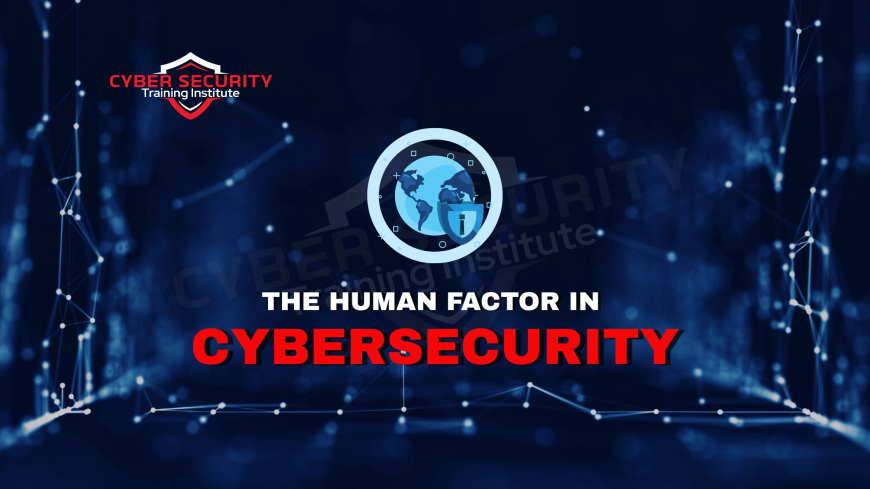Why You’re the Weakest Link in Your Company’s Cybersecurity Chain
Imagine this: your company’s sensitive data—customer records, financial details, trade secrets—gone in an instant. A single click on a suspicious email link, a weak password scribbled on a sticky note, or a moment of carelessness could be all it takes to bring your organization to its knees. Cybersecurity isn’t just about firewalls and fancy software; it’s about people. And, yes, that means you. You might not realize it, but as an employee, you could be the weakest link in your company’s cybersecurity chain. This blog explores why human error is the biggest threat to cybersecurity and how you can become a strength instead. In today’s digital world, cyberattacks are more common than ever. Hackers don’t always need advanced skills to breach a company’s defenses—they often rely on exploiting human mistakes. From phishing scams to neglecting software updates, the smallest slip-up can have massive consequences. Let’s dive into why you, the employee, might be the weakest link and how you can help protect your organization.

Table of Contents
- The Human Factor in Cybersecurity
- Common Mistakes Employees Make
- The Impact of Human Error
- How to Strengthen Your Cybersecurity Role
- Conclusion
- Frequently Asked Questions
The Human Factor in Cybersecurity
Cybersecurity is often seen as a technical issue, handled by IT teams with complex tools and systems. But no matter how strong a company’s defenses are, they’re only as effective as the people using them. Humans are unpredictable, and hackers know this. They target employees because they’re often easier to exploit than cracking through layers of code.
Studies consistently show that human error is a leading cause of data breaches. A 2023 report by Verizon found that 74% of breaches involved a human element, such as clicking on malicious links or sharing sensitive information. Unlike machines, humans can be tricked, distracted, or careless—making them a prime target for cybercriminals.
Think about it: a hacker doesn’t need to break into a secure server if they can convince you to hand over your login details. This is why understanding your role in cybersecurity is crucial. You’re not just doing your job—you’re guarding your company’s digital front door.
Common Mistakes Employees Make
Employees don’t intentionally sabotage their company’s security, but small oversights can lead to big problems. Here are some common mistakes that make you a weak link:
- Weak Passwords: Using “password123” or your pet’s name makes it easy for hackers to guess your credentials.
- Phishing Scams: Clicking links or downloading attachments from suspicious emails can install malware on your device.
- Ignoring Updates: Failing to update software leaves systems vulnerable to known exploits.
- Sharing Credentials: Sharing passwords with coworkers or using the same password across multiple sites increases risks.
- Unsecured Devices: Using personal devices for work without proper security measures can expose company data.
Here’s a quick look at how often these mistakes lead to breaches:
| Mistake | Percentage of Breaches (2023) |
|---|---|
| Phishing | 44% |
| Weak Passwords | 29% |
| Unpatched Software | 18% |
| Credential Sharing | 9% |
These numbers show how everyday actions can open the door to cyberattacks. Let’s explore why these mistakes are so costly.
The Impact of Human Error
When you make a cybersecurity mistake, the consequences can ripple across your organization. Here’s what could happen:
- Financial Loss: Data breaches cost companies millions in recovery, fines, and lost business. The average cost of a breach in 2023 was $4.45 million, according to IBM.
- Reputation Damage: Customers lose trust in companies that can’t protect their data, leading to lost sales and damaged relationships.
- Operational Downtime: A cyberattack can halt operations, from locked systems to disrupted supply chains.
- Legal Consequences: Mishandling sensitive data can lead to lawsuits or regulatory penalties, especially under laws like GDPR or CCPA.
Consider a real-world example: in 2017, a major credit agency suffered a breach because an employee failed to apply a software patch. This exposed the personal data of 147 million people, leading to lawsuits and a damaged reputation. One small oversight had massive consequences.
Your actions matter. A single mistake can affect not just you but your colleagues, customers, and the entire company. The good news? You can also be part of the solution.
How to Strengthen Your Cybersecurity Role
Becoming a cybersecurity asset isn’t about being a tech expert—it’s about adopting smart habits. Here’s how you can strengthen your role:
- Use Strong Passwords: Create complex passwords with letters, numbers, and symbols. Use a password manager to keep track of them.
- Be Wary of Emails: Don’t click links or download attachments from unknown senders. Look for red flags like typos or urgent demands.
- Update Regularly: Install software updates promptly to patch vulnerabilities.
- Enable Two-Factor Authentication (2FA): Add an extra layer of security by requiring a second verification step, like a code sent to your phone.
- Stay Educated: Attend cybersecurity training sessions offered by your company to stay informed about new threats.
- Secure Your Devices: Use antivirus software, encrypt sensitive data, and avoid using public Wi-Fi for work tasks.
By adopting these practices, you become a human firewall, protecting your company from the inside out. It’s not about perfection—it’s about diligence.
Conclusion
Cybersecurity isn’t just the IT team’s job—it’s everyone’s responsibility. As an employee, your actions can either weaken or strengthen your company’s defenses. From weak passwords to falling for phishing scams, human errors are the leading cause of data breaches. But by understanding the risks and adopting simple, proactive habits, you can transform from the weakest link into a vital asset. Stay vigilant, keep learning, and take your role in cybersecurity seriously. Your company’s safety depends on it.
Frequently Asked Questions
What is a phishing attack?
A phishing attack is when cybercriminals send fake emails, texts, or messages pretending to be a trusted source to trick you into sharing sensitive information or clicking malicious links.
Why are weak passwords a problem?
Weak passwords are easy for hackers to guess or crack, giving them access to your accounts and potentially your company’s systems.
How can I create a strong password?
Use a mix of uppercase and lowercase letters, numbers, and symbols, and make it at least 12 characters long. Avoid using personal information like your name or birthday.
What is two-factor authentication (2FA)?
2FA adds an extra layer of security by requiring a second form of verification, like a code sent to your phone, in addition to your password.
Can I use the same password for multiple accounts?
No, using the same password across accounts increases the risk of multiple accounts being compromised if one is hacked.
What should I do if I get a suspicious email?
Don’t click any links or download attachments. Report the email to your IT team and delete it.
Why do software updates matter?
Updates often include security patches that fix vulnerabilities hackers can exploit.
What is malware?
Malware is malicious software designed to harm or gain unauthorized access to your device, often installed through phishing or unsecure downloads.
How can I spot a phishing email?
Look for red flags like spelling errors, urgent demands, unfamiliar senders, or suspicious links. Hover over links (without clicking) to check their destination.
Is it safe to use public Wi-Fi for work?
No, public Wi-Fi is often unsecured. Use a virtual private network (VPN) if you must work on public Wi-Fi.
What is a data breach?
A data breach occurs when unauthorized individuals access sensitive or confidential information, like customer data or company secrets.
Can my personal device cause a company breach?
Yes, if your personal device lacks security measures like antivirus software or encryption, it can be a gateway for hackers to access company systems.
How often should I change my passwords?
Change passwords every 6-12 months or immediately if you suspect a breach.
What is a password manager?
A password manager is a tool that securely stores and generates complex passwords, making it easier to use unique passwords for each account.
Why do companies offer cybersecurity training?
Training helps employees recognize threats like phishing and adopt safe practices to protect company data.
What happens if my company has a data breach?
A breach can lead to financial losses, reputation damage, operational downtime, and legal consequences.
Can I share my work password with a colleague?
No, sharing passwords increases the risk of unauthorized access. Each employee should have their own credentials.
What is encryption?
Encryption scrambles data to make it unreadable without a key, protecting it from unauthorized access.
How do hackers exploit human error?
Hackers use tactics like phishing, social engineering, or exploiting weak passwords to trick employees into giving access to systems or data.
What can I do to stay safe online?
Use strong passwords, enable 2FA, update software, avoid suspicious links, and stay educated about cybersecurity threats.
What's Your Reaction?
 Like
0
Like
0
 Dislike
0
Dislike
0
 Love
0
Love
0
 Funny
0
Funny
0
 Angry
0
Angry
0
 Sad
0
Sad
0
 Wow
0
Wow
0















